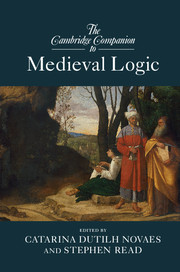Book contents
- Frontmatter
- Contents
- List of Contributors
- Introduction
- PART I PERIODS AND TRADITIONS
- 1 The Legacy of Ancient Logic in the Middle Ages
- 2 Arabic Logic up to Avicenna
- 3 Arabic Logic after Avicenna
- 4 Latin Logic up to 1200
- 5 Logic in the Latin Thirteenth Century
- 6 Logic in the Latin West in the Fourteenth Century
- 7 The Post- Medieval Period
- PART II THEMES
- Bibliography
- Index
7 - The Post- Medieval Period
from PART I - PERIODS AND TRADITIONS
Published online by Cambridge University Press: 05 September 2016
- Frontmatter
- Contents
- List of Contributors
- Introduction
- PART I PERIODS AND TRADITIONS
- 1 The Legacy of Ancient Logic in the Middle Ages
- 2 Arabic Logic up to Avicenna
- 3 Arabic Logic after Avicenna
- 4 Latin Logic up to 1200
- 5 Logic in the Latin Thirteenth Century
- 6 Logic in the Latin West in the Fourteenth Century
- 7 The Post- Medieval Period
- PART II THEMES
- Bibliography
- Index
Summary
Making a clear division between the medieval and the post-medieval periods is impossible, especially if the end of the fourteenth century is taken as a cut-off point. The next century and a half certainly embraced big and important changes in the study of logic, but the new humanist developments were contemporary with continued work in the areas thought of as specifically medieval, such as supposition theory, and indeed there was a flowering of medieval logic in early-sixteenth-century Paris with the work of such men as John Mair (or Major). However, by the mid-sixteenth century, specifically medieval developments had largely died out, leaving behind only fragments of supposition theory and some simplified work on consequences. Aristotle's logic continued to be centrally important throughout the period, but the approach to it came to be very different from that of the Middle Ages. The Greek text of Organon was widely available by the end of the fifteenth century, and could be studied by senior students and teachers, but the main undergraduate teaching came to be done largely through elementary textbooks that summarized Aristotelian logic in simpler language and without the lengthy doctrinal discussions and illustrative sophismata that had characterized many medieval commentaries.
This chapter has two main parts. The first part discusses the effects that historical events and movements had on educational systems and the logical studies thought to be suitable for undergraduates. The Western reception of the printing press in the middle of the fifteenth century was perhaps the most important event, for it accentuated the impact of the other events and movements. Suddenly it became possible to produce books cheaply, in relatively large numbers, and without the differences between one copy and another that often make work with manuscripts so difficult. By the end of the fifteenth century, many university towns had presses able to print the textbooks needed by the faculty of Arts, and teachers could disseminate their own works. Moreover, publishers, especially in Italy, were able to print the works required for serious scholarship, such as Aristotle's Organon in Greek and the newly discovered Greek commentaries on Aristotle, while in the sixteenth century, the writings of the Protestant reformers and their Roman Catholic opponents could be widely circulated.
- Type
- Chapter
- Information
- The Cambridge Companion to Medieval Logic , pp. 166 - 192Publisher: Cambridge University PressPrint publication year: 2016
- 4
- Cited by

